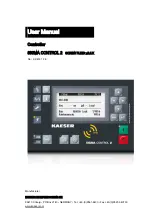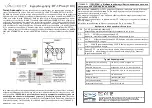
Network I/O Support
3-21
3
RARP/ARP Protocol Modules
The Reverse Address Resolution Protocol (RARP) basically consists
of an identity-less node broadcasting a ‘‘whoami’’ packet onto the
Ethernet, and waiting for an answer. The RARP server fills an
Ethernet reply packet up with the target's Internet Address and
sends it.
The Address Resolution Protocol (ARP) basically provides a
method of converting protocol addresses (e.g., IP addresses) to local
area network addresses (e.g., Ethernet addresses). The RARP
protocol module supports systems which do not support the
BOOTP protocol (next paragraph).
BOOTP Protocol Module
The Bootstrap Protocol (BOOTP) basically allows a diskless client
machine to discover its own IP address, the address of a server host,
and the name of a file to be loaded into memory and executed.
TFTP Protocol Module
The Trivial File Transfer Protocol (TFTP) is a simple protocol to
transfer files. It is implemented on top of the Internet User
Datagram Protocol (UDP or Datagram) so it may be used to move
files between machines on different networks implementing UDP.
The only thing it can do is read and write files from/to a remote
server.
Network Boot Control Module
The control capability of the Network Boot Control Module is
needed to tie together all the necessary modules (capabilities) and
to sequence the booting process. The booting sequence consists of
two phases: the first phase is labeled ‘‘address determination and
bootfile selection’’ and the second phase is labeled ‘‘file transfer’’.
The first phase will utilize the RARP/BOOTP capability and the
second phase will utilize the TFTP capability.
Summary of Contents for 700 Series
Page 2: ......
Page 3: ...700 800 Series MVME162LX Embedded Controller Installation and Use V162 7A IH1 ...
Page 48: ...1 34 Board Level Hardware Description 1 ...
Page 70: ...2 22 Hardware Preparation and Installation 2 ...
Page 138: ...A 18 Configure and Environment Commands A ...
Page 144: ...B 6 Disk Tape Controller Data B ...
Page 146: ...C 2 Network Controller Data C ...
















































